We're closing this live blog for the night. Coverage will continue on Thursday morning. Thanks for reading and for your comments below.
Hamas: killing of military chief by Israel has 'opened gates of hell' - as it happened
Strikes to go on until 'peace and quiet' is enforced
Hamas says Israel attack has 'opened gates of hell'
Egypt withdraws ambassador to Israel in protest
Washington: 'We will stand by our Israeli partners'
Read our latest summary | news story
Wed 14 Nov 2012 18.27 EST
First published on Wed 14 Nov 2012 19.47 ESTLive feed
The Palestinian Authority has urged the UN Security Council to take a stand on Israel's latest offensive in the Gaza Strip, Reuters reports.
Palestinian envoy Riyad Mansour said:
There is an expectation that ground forces might move into the Gaza Strip very shortly. The situation is escalating. We want the Security Council to act in accordance with its responsibilities to stop this aggression against our people.
Israel's UN Ambassador Ron Prosor responded by calling on the international community to condemn "indiscriminate rocket fire against Israeli citizens - children, women".
The UN press office said the Security Council planned to hold closed-door consultations on an Egyptian request for an emergency meeting to discuss the crisis.
Summary
Israel killed Hamas military leader Ahmed al-Jaabari in an airstrike on his car in Gaza. Israel followed the assassination with sustained air and naval strikes across Gaza, concentrating in the north. Hamas vowed to avenge the act.
Israeli officials said the offensive, called "Pillar of Defense," was meant to stop the launch of hundreds of rockets on civilian populations in southern Israel in recent months.
At least nine Palestinians have been killed in the strikes, including women and children, according to the Palestinian envoy to the UN. That number was expected to climb, possibly significantly. Dozens of Palestinians were reported injured.
Israeli Defense Minister Ehud Barak said, "We are still at the beginning of the event, not at the end, and we expect some complicated tests ahead." He said that increased deterrence, as well as taking out Hamas' rocket-launching capability, is a primary goal of the offensive.
Egypt recalled its ambassador to Israel, condemning the attack. President Morsi called for an emergency meeting of the UN Security Council. The Arab League announced a meeting on the crisis to take place Saturday.
The assault is the widest offensive against Gaza since the Israeli invasion of 2008-2009, known as Cast Lead, in which at least 1,100 Palestinians and 13 Israelis died.
At least 90 rockets were fired from Gaza into Israel Wednesday. There were no reports of casualties.
The United States pledged its support to Israel, asking that it "take every effort to avoid civilian casualties." President Obama did not mention the conflict in an hourlong news conference today, and he was not asked by reporters about it.
The Syrian government denounced the "barbaric crimes" in Gaza. Obama said the United States had no plans to grant official recognition to the Syrian opposition.
Al-Jazeera has compiled a list of Hamas leaders assassinated by Israel.
The list runs from the January 1996 attack on bombmaker Yahya Ayyash, killed by a mobile phone packed with explosives, to the January 2010 attack on Mahmoud al-Mabhouh, senior Hamas military commander, suffocated in a five-star hotel in Dubai.
Full list here.
The bombardment of Gaza continues. Strikes appear to be concentrated in the north. Multiple observers on the ground report near-continuous strikes, apparently a combination of air strikes and naval fire.
Haaretz puts the number of rockets fired from Gaza today at 83. The IDF says 25 rockets have been intercepted by the Iron Dome defense system.
The Al-Qassam Brigades has reported launching rockets at Israel "military bases." There are multiple reports of Hamas rockets landing around the Israeli city of Ashkelon north of Gaza and Be'er Sheva to the east. The number of rockets launched on Israel from Gaza is unknown, as are figures for any casualties.
Haaretz columnists Amos Harel and Avi Issacharoff write that the current attack is "far beyond the amplitude of the friction between the sides in recent days" and is likely to produce a protracted conflict:
In Hamas they understood that an Israeli response was expected – and therefore its heads on Tuesday went along with the Egyptian call to agree to a truce. However, it is doubtful that Hamas expected the response would be so harsh. This is not just “another” assassination (and there haven’t been assassinations of second tier activists in almost four years), but rather a hit on one of the top people in the movement and the person in the leadership most identified with the terror struggle against Israel.
Read the whole piece here.
Syria denounces 'barbaric crimes' in Gaza
In a dispatch that audibly groans under the weight of irony devoid of humor, the Assad government has denounced the violence in Gaza, the official Syrian news agency reports:
The Syrian government denounced the barbaric, reprehensible crimes committed by the Israeli army against the Palestinian people in Gaza Strip on Wednesday which resulted in a number of martyrs and injured.
In a statement, the government called on the international community to pressure Israel into ceasing its aggression on the people of Gaza Strip, imploring the free and honest people of the world to move seriously to confront this tyranny and repel Israel which constantly ignores international legitimacy and shirks international resolution in blatant violation of international law.
(h/t: @LizSly)
The US State Department has issued a brief statement condemning Hamas and expressing support for Israel.
The statement was summarized by the AP [UPDATE: replacing summary with verbatim portions of statement]:
"We support Israel's right to defend itself, and we encourage Israel to continue to take every effort to avoid civilian casualties," US State Department spokesman Mark Toner said in a statement.
"We strongly condemn the barrage of rocket fire from Gaza into southern Israel, and we regret the death and injury of innocent Israeli and Palestinian civilians caused by the ensuing violence.
"There is no justification for the violence that Hamas and other terrorist organizations are employing against the people of Israel," Toner said in his statement, calling on them "to stop these cowardly acts immediately."
"Hamas claims to have the best interests of the Palestinian people at heart, yet it continues to engage in violence that is counterproductive to the Palestinian cause," he added.
"Attacking Israel on a near daily basis does nothing to help Palestinians in Gaza or to move the Palestinian people any closer to achieving self determination."
Filmmaker and activist Harry Fear is broadcasting live video from Gaza City. From the roof of his building, he reports, he can see "at least 10 Israeli naval vessels" off the coast.
The political leader of Hamas, Ismail Haniyah, has issued a statement of defiance as the Israeli attack continues.
"We do not fear the fate of our people," Haniyah said, according to Beirut-based Al-Quds TV, the BBC's Shaimaa Khalil reports. "Resistance in face of monstrous Israeli onslaught."
Gaza strike: pictures
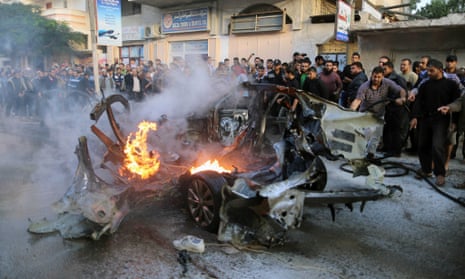
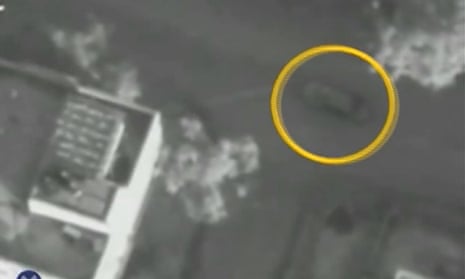
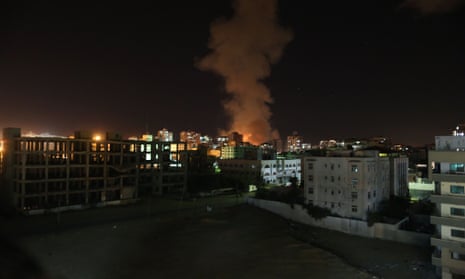
My colleague Harriet Sherwood in Jerusalem has just spoken with Sami Abu Salem, a journalist living in Jabaliya, near Gaza City. He describes civilian casualties and "big crowds at the hospital":
He has three children, aged 6, 3 and 18 months. There is a total blackout at the moment in his neighbourhood."We have lost connection with everything. At this moment I can hear the sounds of drones hovering in the sky. There were very very strong explosions near my house earlier. My house was shaking. The children were scared and shouting and coming to hug me. I was trying to calm them down but I was also very afraid.
"Some people are rushing to the supermarket to buy canned food - sardines and beans - because they expect this war to continue.
"Three hours ago I visited the Shifa [Gaza City's main hospital]. There were cars bringing wounded civilians - women and children. I saw people bleeding from their heads and necks, a baby who was badly burned. Later I heard he died. There were big crowds at the hospital.
"I heard Hamas have asked Egypt and Qatar to intervene. They know Israel is the stronger party.
"Hamas will shoot rockets but after that it may calm down. They always say they will 'make an earthquake' because they need to do something for their reputation. I think this will continue for at least a couple of days."
In a list of 424 people tweeting from Gaza, reports of new explosions spring up simultaneously in multiple accounts.
#Breaking: Another Explosion heard in #gaza city now, #GazaUnderAttack
— Osama Shomer (@OsamaShomar) November 14, 2012
Another explosion in Al-Nusirat now #Gaza #GazaUnderAttack
— Yousef M. Aljamal (@YousefAljamal) November 14, 2012
10:50 pm| #BeitHanoun | loud explosion heard on the town's borders.#GazaUnderAttack#Gaza#Palestine#israel
— Samer (@Masterpiece_s) November 14, 2012
The Palestinian envoy to the United Nations said at least nine people have been killed in Israeli air strikes on the Gaza Strip. The envoy, Riyad Mansour, said the number was likely rise.
"The number of Palestinians killed in Gaza so far is nine and the number is increasing," Mansour told reporters. (via)
The Arab League has announced a meeting to be held Saturday on the situation in Gaza, reports radio Sawa:
#BREAKING: Arab League discuss #Gaza crisis Saturday
— Zaid Benjamin (@zaidbenjamin) November 14, 2012
Barak: 'We are still at the beginning of the event, not at the end'
My colleague Harriet Sherwood in Jerusalem sends the text of Israeli Defense Minister Ehud Barak's remarks at a news conference this evening. Barak said Israeli carried out strikes on "long-range Fajr missiles, additional Hamas infrastructure, as well as other terror elements." He also said in part:
We must be clear that Israel will not tolerate a situation in which there is incessant [rocket] fire on our citizens. No life loving country would accept this situation.
The goals of the operation are as follows:
1. Strengthening our deterrence
2. To inflict serious damage on the rocket launching network
3. To deliver a painful blow for Hamas and the other terrorist organizations
4. To minimize damage to our home front
[...]
There is no ‘quick-fix’ solution. Right now, as we stand here, massive barrages of missiles are being fired at our cities. But we will achieve these aforementioned goals throughout the course of this operation. [...]
We are still at the beginning of the event, not at the end, and we expect some complicated tests ahead. It will require vigilance; not only in Gaza, but also in Israel and in Judea and Samaria. But in the long run I believe that this operation will contribute to strengthening deterrence and reinstituting the calm in the south. I call upon the leaders of the region to act with composure, in order to promote stability and restore quiet so that we are not – heaven forbid – dragged into further deterioration.
Terrible images (not a direct link to image) are making their way out of Gaza.
BBC foreign editor Jon Williams writes that a son of a colleague has been killed in Gaza.
11 month old son of BBC colleague killed in #Gaza. Sister-in-law killed, brother critically injured. Civilians always casualties of conflict
— Jon Williams(@WilliamsJon) November 14, 2012
In what is shaping up to be the first serious test of Egyptian-Israeli relations in the post-Mubarak era, Egypt so far has condemned the Israeli assault, recalled its ambassador, and asked for an emergency UN meeting. The Muslim Brotherhood's political party used harsh language in condemning the Israeli state.
President Mohamed Morsi's response to the Israeli attack is being closely watched. He is under pressure from close allies – and from constituents who share the sentiment below – to demonstrate that the balance of power in the region has changed.
This is Morsy's chance to prove he indeed is a loyal representative of Isalm! #Gaza
— Tariq Atiyah (@tariqatiyah) November 14, 2012
Morsi raised eyebrows when he took a day to respond to the attack on the US embassy in Cairo on 11 September. The tacit message for the United States seemed to be that Egypt was no longer the compliant state the Americans – and the rest of the world – is accustomed to.
Empty streets in Gaza.
Streets of #Gaza city deserted tonight. Sound of drones overhead.
— Jon Donnison (@JonDonnison) November 14, 2012
Egyptian President Mohamed Morsi has ordered his UN representative to call for an emergency security council meeting over Israel's strikes on Gaza, Reuters reports.
Syria
President Obama said that the United States would not recognize the Syrian opposition, as France has. However he said the opposition was showing signs of cohesion and he considers them a "legitimate representative" of the people.
(h/t: @AndDeRosa)
Some chest-thumping by the Israeli Defense Forces:
Ahmed Jabari: Eliminated. twitter.com/IDFSpokesperso…
— IDF (@IDFSpokesperson) November 14, 2012
Egypt recalls ambassador to Israel
Egypt state television has reported that the country is recalling its ambassador to Israel, Atef Salem.
Salem started at the job just last month.
Obama forcefully defends Rice on Libya
Obama delivered a forceful vocal show of support for UN Ambassador Susan Rice, in response to a question about Sen. John McCain and Sen. Lindsay Graham vowing to block a potential Rice nomination as Secretary of State because of what they say were her misleading statements about what happened in the 11 September attack in Benghazi, LIbya.
"She made an appearance at the request of the White House in which she gave her best understanding of the intelligence that was provided to her," Obama said. "If Senator McCain or Senator Graham want to go after somebody, they should go after me."
Obama mentions Israel, vis-a-vis Syria, not Gaza
Fifty minutes into his news conference, President Obama is asked about Syria, and what he is doing to help the opposition. In the course of his answer he mentions Israel for the first time. He does not mention Gaza.
"I was one of the first leaders to say Assad had to go, in response to the brutality his government displayed in the face of peaceful protests," Obama says.
He says he has engaged with international partners to provide humanitarian aid and that the US is in consultation with the opposition.
"We are in very close content with Turkey and... countries in the region, including of course Israel, which is having already, grave concerns as we do about for example movements of chemical weapons..."
The press conference is over.
Summary
Israeli air strikes killed Ahmed al-Jaabari, the head of the military wing of Hamas, as he traveled in a car in the Gaza Strip. His son was reportedly killed with him.
The Israeli battery of Gaza continues, including air strikes and naval strikes. The number of casualties is unknown.
Israeli defense minister Ehud Barak has said the attack will continue for as long as is "necessary to achieve peace and quiet." Israeli officials say frequent rocket attacks from Gaza into southern Israel were unacceptable. The IDF said the attack could last days.
The Hamas Al-Qassam Brigades reports it is firing rockets into Israel. Israeli sources say more than a dozen rockets were intercepted by the Iron Dome defense system.
Israeli has called up some reservists, indicating the possibility of a ground invasion. There are currently no reports of such an invasion.
The two sides trade taunts on social media.
@idfspokesperson Our blessed hands will reach your leaders and soldiers wherever they are (You Opened Hell Gates on Yourselves)
— Alqassam Brigades (@AlqassamBrigade) November 14, 2012
Both Hamas' military wing the Al-Qassem Brigades and the Israeli Defense Forces are live-tweeting the conflict.
Al Qassam shell #Israel's military bases in Beer Sheva with dozens of mortars in response on assassination of its top leader #hamas #Gaza
— Alqassam Brigades (@AlqassamBrigade) November 14, 2012
Iron Dome successfully intercepts 13 rockets fired from the #Gaza Strip. #PillarOfDefense
— IDF (@IDFSpokesperson) November 14, 2012
Israeli Prime Minister Binyamin Netanyahu and Defense Minister Ehud Barak have held a news conference on the attack.
Netanyahu said that Hamas and Islamic Jihad "intentionally hurt our citizens while hiding behind their own citizens," Haaretz reports.
Barak said Israel is not interested in engaging in war, "but Hamas' provocation in the past days has made it imperative that we act sharply and decisively....The army will do everything that is necessary to achieve peace and quiet. We will achieve what we set out to do."
Israeli Ambassador to the United States Michael Oren says the scope of the assault on Gaza "depends on Hamas":
The scope of the IDF's defensive operation depends on Hamas & whether it takes the decision to cease firing missiles on our homes.
— Michael B. Oren (@AmbassadorOren) November 14, 2012
President Obama has opened his news conference at the White House. He begins with a discussion of the American economy. After a five-minute statement he begins to take questions. The first one is about the scandal surrounding fallen CIA chief David Petraeus.
We now are seeing multiple reports that Israeli warships are firing from the Mediterranean into Gaza, which has a densely packed population of about 1.5m people living inside 140 square miles.
The IDF confirms the Israeli Navy is striking Gaza.
Haaretz and the IDF say that at least 10 rockets fired from Gaza have been intercepted by the Iron Dome system.
IDF: 'recommend' Hamas lies low 'in the days ahead'
The IDF has just sent a tweet that appears to announce a major operation on Gaza lasting days. The extent to which Israeli ground troops are involved or will be involved is unclear.
We recommend that no Hamas operatives, whether low level or senior leaders, show their faces above ground in the days ahead.
— IDF (@IDFSpokesperson) November 14, 2012
Reports of explosion at Zahar home retracted
Haaretz has walked back its earlier report that an explosion had hit the home of Hamas co-founder Mahmoud al-Zahar:
Contrary to earlier report, #Palestinians say explosion took place in house of Rashid Abu Shabak, not Mahmoud al-Zahar htz.li/QGH47V
— Haaretz.com (@haaretzcom) November 14, 2012
Sources in #Gaza says house of senior Hamas leader Mahmoud Al Zahar NOT targeted despite rumours.
— Jon Donnison (@JonDonnison) November 14, 2012
President Obama is expected to appear shortly at a pre-planned news conference, at which he was to speak about his re-election and plans for his second term.
Meanwhile Pentagon spokesman Lieutenant Colonel Stephen Warren released a statement in support of Israel:
"We're monitoring the situation closely," Warren said. "We stand by our Israeli partners in their right to defend themselves against terrorism."
The YouTube user Gaza Now has uploaded a video purporting to capture Gaza City this evening with smoke rising from many attack sites. The provenance of the video could not be independently verified.
Palestinian President Mahmoud Abbas has called for an urgent Arab League meeting on Israel's strikes on Gaza, Reuters reports.
Abbas' urgent call was reported by Egypt's news agency MENA, quoting a Palestinian official in Egypt.
"Barakat al-Fara, the Palestinian ambassador in Cairo and the Palestinian representative in the Arab League, announced that based on instructions from President Mahmoud Abbas, the Palestinian state had asked for an urgent meeting of the Arab League to discuss the Israeli offense on Gaza strip," MENA said.
Many Twitter users inside Gaza echo an entry that just appeared on Haaretz's live blog reporting an "explosion in house of Hamas cofounder Mahmoud al-Zahar, in Gaza."
Zahar, who is in his late 60s, met last month with Iranian President Mahmoud Ahmadinejad. It is unclear whether he was wounded in the apparent attack.
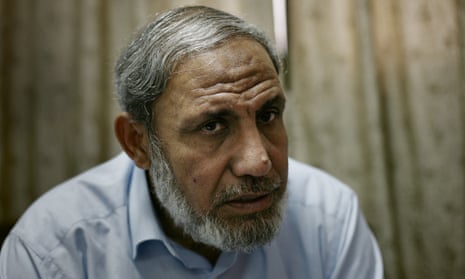
The Christian Science Monitor's Dan Murphy:
Wow, Zahar. No confirmation that he's been hit. But if he has been, well, he's the strategic brains of Hamas in Gaza.
— Dan Murphy (@bungdan) November 14, 2012
UPDATE: Haaretz has walked back its report that Zahar's home has been hit:
Sources in #Gaza says house of senior Hamas leader Mahmoud Al Zahar NOT targeted despite rumours.
— Jon Donnison (@JonDonnison) November 14, 2012
Contrary to earlier report, #Palestinians say explosion took place in house of Rashid Abu Shabak, not Mahmoud al-Zahar htz.li/QGH47V
— Haaretz.com (@haaretzcom) November 14, 2012
As many commenters have noted, the latest assault on Gaza coincides with early campaigning for Israel's parliamentary elections, planned for 22 January.
The IDF says the current assault was provoked by hundreds of missile strikes out of Gaza. Political observers note the attack reflects on Prime Minister Binyamin Netanyahu, who was to meet with his senior security cabinet "after sundown" tonight, as a strong leader.
The Egyptian Muslim Brotherhood's Freedom and Justice Party has issued a defiant statement condemning the assault, the BBC's Shaimaa Khalil reports.
A statement by #MuslimBrotherhood's #FJP:#Egypt "will not allow the Palestinians to be subjected to Israeli aggression as in the past" #Gaza
— shaimaa khalil(@Shaimaakhalil) November 14, 2012
The assault continues.
Massive explosion just now heard from our office in #Gaza City.
— Jon Donnison (@JonDonnison) November 14, 2012
The name of Gilad Shalit, the Israeli soldier kidnapped in 2006 who was at the center of a prisoner exchange in October 2011, has emerged repeatedly in the IDF's explanation of why Jaabari was targeted. Jaabari was a key negotiator of the exchange.
Leibovitch said Jaabari had "a lot of Israeli blood on his hands" and "was involved in the Gilad Shalit matter."
Avital Leibovitch, the Israeli military spokeswoman, has just spoken with BBC. She said air strikes have hit 20 sites in Gaza.
"We targeted specific terror sites that either store rockets used to target Israelis or weapons caches or warehouses," Leibovitch said. She denied reports that police stations and non-military sites had been hit.
"We have started an operation directed toward terror targets in the Gaza Strip following a very long year of rocket launches... The first target was [Jaabari]," Leibovitch said.
She said the operation will continue "as long as it takes to protect the people of Israel."
Asked about the Hamas statement that the killing of Jaabari had opened the "gates of hell," Leibovitch said, "The gates of hell for us is having 15 seconds for the average Israeli to run into a shelter, and this has been happening since 2001."
Video of strike
The IDF has released video of the strike that killed Jaabari.
Reuters quotes Palestinian sources as saying nine people were killed in the strikes on Jaabari's vehicle. Al-Jazeera says the attack killed Jaabari and five others, including Jaabari's son.
The assault on Gaza appears to be ongoing. Since Donnison's tweet of about 20 minutes ago, he has reported one more "explosion" in the north. A Twitter list of 421 people inside Gaza contains many mentions of new explosions.
Al-Jazeera reports that a rocket has been fired from Gaza into Ashkelon, over the northern border.
Al-Jazeera now reports that Israeli air raids continue on Gaza. It appears that a major offensive, called "Pillar of Defense" by the IDF, is indeed under way.
I'm going to hand over to my colleague Tom McCarthy now. Thanks for all the comments.
Israeli newspaper Haaretz reports that the IDF has issued "draft orders for Israeli Homefront Command reserve soldiers".
Breaking news: #IDF issues draft orders for Israeli Homefront Command reserve soldiers bit.ly/UDeJkd #Gaza #Hamas
— Haaretz.com (@haaretzcom) November 14, 2012
BBC reporter Jon Donnison is reporting another large explosion north of Gaza City.
Another large explosion heard north of #Gaza City just now.
— Jon Donnison (@JonDonnison) November 14, 2012
The Associated Press is reporting that Binyamin Netanyahu is meeting with his senior security cabinet "after sundown" tonight, according to officials. AP reports:
Plumes of black smoke wafted into Gaza City's skies following at least five airstrikes, in atmosphere reminiscent of Israel's large scale 2008-2009 attack on Gaza. Ambulance sirens blared as people ran in panic in the streets and militants fired angrily into the air ... Outside the hospital [where Jaabari's body was taken], thousands of angry Gazans chanted "retaliation" and "we want you to hit Tel Aviv tonight".
Israeli military spokeswoman Avital Leibovitch said Israeli aircraft had targeted 20 locations in Gaza that served as storage or launching sites for rockets. Among the weapons destroyed were rockets that could hit as far as 25m (40km) into Israel, she said.
Dovish Israeli lawmaker Dov Hanin condemned the killing. "Assassinating leaders is never the solution. In place of the leaders killed, other will grow, and we will only get another cycle of fire and blood," he said.
Israeli opposition leader Shaul Mofaz, a former chief of staff who has supported targeted killings, welcomed the strike. "We need to continue this policy, to find them in every place," he told Israel's Army Radio. "Israel needs to determine the agenda, not Jaabari."
On its official Facebook page, Egypt's Freedom and Justice Party, the Muslim Brotherhood's political arm, called the assassination a "crime that requires a quick Arab and international response to stem these massacres against the besieged Palestinian people in the Gaza Strip." It accused Israel of trying to "drag the region toward instability".
The British Foreign Office has warned against an escalation of violence:
We continue to call on all sides to exercise restraint to prevent a dangerous escalation that would be in no one’s interests. #Gaza
— Foreign Office (FCO) (@foreignoffice) November 14, 2012
Hamas spokesman Osama Hamdan was interviewed on al Jazeera a little earlier. He said a new military leader would soon "stand in his [Jaabari's] position" but he would not give a name.
Would Hamas respond to the killing?
We will. We will. That must happen. I have to say clearly. We know that this road of liberation is very long. We have had to sacrifice a lot.
He said there had always been a response from Palestinians when other leaders had been assassinated. In one case that had undermined former PM Shimon Peres's position, leading to his losing the subsequent election.
If Netanyahu expects that he will win the election after the assassination of Ahmed al-Jaabari he is totally wrong.
What would be the response - rocket attacks, suicide bombings inside Israel? Hamdan replied:
I can't say what will happen, but I am sure that this will happen.
The Gazan leadership would decide how to respond, he said.
Reuters reports that Palestinians have said nine people were killed in the attack that assassinated Jaabari, including a seven-year-old girl. Al Jazeera is reporting that the Hamas military chief's son was also among the dead.
Reuters witnesses reported numerous explosions around Gaza, with Hamas security compounds and police stations among the targets.
Al Jazeera's Cairo correspondent has been telling the channel that in Egypt the assassination of Jaabari is being viewed as "Operation Re-elect Binyamin Netanyahu".
Last month the prime minister called early elections for January because parliament could not agree on a new austerity budget.
Avital Leibovitch, an Israeli military spokeswoman, is being interviewed on al Jazeera.
She says Jaabari had "a lot of Israeli blood on his hands".
Referring to attacks on Israel from militants in Gaza, she says: "More than 700 rockets in the last year alone – does this seem normal to a western country?"
Is Israel considering a ground offensive?
All options are on the table for us. We'll continue to do what is necessary to protect the people of Israel.
Al Jazeera is reporting that Egypt has condemned the killing of Jaabari.
My colleague Harriet Sherwood in Jerusalem says that, as the Israel Defence Force tweet earlier suggests, the IDF is indeed saying that ground forces are standing by.
The BBC's Jon Donnison is reporting from Gaza on Twitter.
News of Ahmed Jabari's killing being broadcast from mosques in #Gaza. "Its war" one Gazan told me.
— Jon Donnison (@JonDonnison) November 14, 2012
Car horns and gunfire across #Gaza city.
— Jon Donnison (@JonDonnison) November 14, 2012
Streets of #Gaza City emptying as I drive through with news of more airstrikes coming through on car radio.
— Jon Donnison (@JonDonnison) November 14, 2012
More dead bodies being brought into #Gaza city's Shifa hospital morgue where i've just been.
— Jon Donnison (@JonDonnison) November 14, 2012
Alarmingly, a spokesperson for the Israeli Defence Force has just tweeted that today's attack may lead to a "ground operation".
All options are on the table. If necessary, the IDF is ready to initiate a ground operation in Gaza.
— IDF (@IDFSpokesperson) November 14, 2012
Israel's military spokesman, Yoav Mordechai, predicts days of fighting to follow Jaabari's killing, according to Reuters. Mordechai said:
The days we face in the south will, in my estimation, prove protracted. The homefront must brace itself resiliently.
According to the Associated Press, Palestinian witnesses say Israeli airstrikes have hit a series of targets across Gaza City, following the assassination of Ahmed al-Jaabari.
Hamas security officials said two Hamas training facilities were among the targets. AP reports:
Plumes of smoke are rising in the air, and people are running in panic through the streets as militants angrily fire their weapons in the air.
My colleague Harriet Sherwood in Jerusalem has more on the killing of Hamas military chief Ahmed al-Jaabari.
In a statement, the IDF said Jaabari was "a senior Hamas operative who served in the upper echelon of the Hamas command", and had been "directly responsible for executing terror attacks against the state of Israel in the past number of years".
Its operation was intended "to severely impair the command-and-control chain of the Hamas leadership, as well as its terrorist infrastructure. This was a surgical operation in co-operation with the Israeli security agency that was implemented on the basis of concrete intelligence and using advanced capabilities."
Israeli military sources said the strike had been the result of "precise intelligence" gathered over a period of months. The Israeli air force carried out multiple air strikes on Wednesday in an operation it named Cloud Pillar, suggesting it had launched a continuing offensive.
Calls for revenge were broadcast in Gaza after the air strikes, Reuters said.
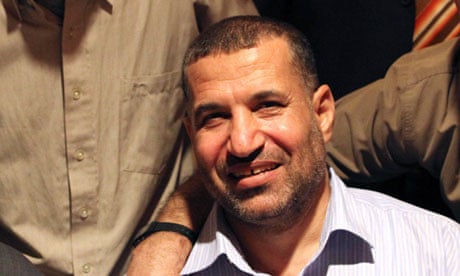
The BBC’s Wyre Davies called the killing of Jaabari “a massive escalation of the situation around Gaza”.
Interviewed on BBC News from Jerusalem just now, Davies said: “It’s a serious escalation of the violence and one would expect some sort of retaliation from Hamas over the coming hours and days,” he said.
Running through the recent violence between Hamas and Israel in and around Gaza, Davies said: “Israel has now taken quite a deliberate decision, with this Operation Cloud Pillar, to assassinate such a senior figure. They don’t do this very often.”
Asked about a possible Hamas response, Davies said it might come through Egypt’s Sinai peninsula: “We know that Gazan militants, Palestinian militants, have been able to get out, either across the Egyptian border or through tunnels, and launch attacks against Israeli positions in southern Israel from the Sinai peninsula.”
Gaza
The killing of Hamas’s military chief, Ahmed al-Jaabari, seems to be the beginning of a new round of hostilities between Israel and the Palestinians in Gaza.
Israel said the killing of Jaabari and a passenger in his car was not the end of this operation and more attacks on Gazan militants would follow.
Hamas said the airstrike had “opened the gates of hell”.
In a statement the Israeli military said: “The purpose of this operation was to severely impair the command and control chain of the Hamas leadership.”
Military spokeswoman Lieutenant Colonel Avital Leibovitch said the attack was the "start of a broader operation”.
Islamic Jihad said: "Israel has declared war on Gaza and they will bear the responsibility for the consequences.”
Hamas has governed Gaza since 2007. Reuters reports that it has been “emboldened” by the election of Mohamed Morsi of the Muslim Brotherhood’s Freedom and Justice party in neighbouring Egypt early this year.
The killing is a dramatic resumption of Israel's policy of assassinating Palestinian militant leaders. Jaabari is the most senior Hamas official to be killed since an Israeli invasion of Gaza four years ago. He has long topped Israel's most-wanted list, the Associated Press reports. Israel blames him for a string of attacks, including the kidnapping of Israeli soldier Gilad Schalit in 2006.
There were signs that Egypt had managed to broker a truce between Israel and Palestinian militants after five days of violence during which more than 100 missiles were fired from Gaza and there were repeated Israeli strikes on the territory.
Golan Heights
The Israeli defence minister, Ehud Barak, has said that "almost all" Syrian villages near the border with the Israeli-held Golan Heights (see map below) had now fallen into rebel hands. Earlier this week Israel opened fire over the border after stray Syrian mortar shells flew into the Golan Heights. Barak said today: "Almost all of the villages, from the foot of this ridge to the very top, are already in the hands of the Syrian rebels." And he said the Syrian army was displaying "ever-diminishing efficiency".
This article includes content provided by Google Maps. We ask for your permission before anything is loaded, as they may be using cookies and other technologies. To view this content, click 'Allow and continue'.
Libya
General Carter Ham, the head of the US military's Africa command, has said that some of those who attacked the US consulate in Benghazi in September, killing ambassador Chris Stevens, were linked to al-Qaida in the Islamic Maghreb. But he said the attack – the origins and response to which continue to be hugely contentious issues in the US – was not necessarily "an AQIM-planned or -organised or -led activity".
Gaza
Hamas has said its military chief, Ahmed al-Jaabari, was killed today in an Israeli airstrike on Gaza. There have been multiple Israeli attacks on Gaza today. Israel's Shin Bet intelligence service confirmed it had carried out the attack, according to Reuters, saying it had killed Jaabari because of his "decade-long terrorist activity".
Summary
Here is a summary of today’s key events so far.
Syria
Turkey has scrambled fighter jets to its south-eastern border with Syria, witnesses told Reuters, in response to a third day’s assault – by aircraft and artillery – on the rebel-held border town of Ras al-Ain. There was no immediate official confirmation from Turkey. Reuters reported “a trickle of refugees” making their way through the barbed-wire fence between Ras al-Ain in Syria and Ceylanpinar in Turkey. But around 11,000 escaped into Turkey last week. Local officials say 30 people have died since Monday, the Associated Press reported. Ankara has vowed to defend itself against Syrian attack, defence minister Ismet Yilmaz saying "the necessary response will be given to Syrian planes and helicopters that violate our border”, and Nato has promised to protect it if that happens. Ninety miles west of Ceylanpinar, three Turkish border villages were evacuated for “security reasons”.
Syrian rebels may have more powerful shoulder-mounted surface-to-air missiles than previously thought, if photographs posted by Brown Moses (Eliot Higgins) on his blog are correct.
Israel
Avigdor Lieberman, Israel’s hardline foreign minister, has suggested his country should topple the Palestinian president, Mahmoud Abbas, if he presses ahead with a request for recognition of the state of Palestine at the UN in two weeks. The Israeli cabinet is considering a range of punitive measures it could take in response to the expected vote, including full or partial annulment of the 1993 Oslo accords. A move to win admission to the UN for Palestine as a full member state stalled last autumn, but Abbas is now aiming to win “non-member state” status. The UN general assembly is expected to back this. Harriet Sherwood has the full story here.
Libya
In Washington, Republican senator John McCain is calling for the establishment of a Watergate-style congressional committee to investigate the death of US ambassador Chris Stevens and three other Americans at the US consulate in Benghazi on 11 September. The facts of the case and the Obama administration’s response to the killings were a major issue in this month’s US presidential election.
Jordan
Damascus
My colleague Mona Mahmood has been speaking to Faris Habib, a resident of the Harasta neighbourhood outside Damascus. He says the situation in the Syrian capital is "normal" and the city is "completely safe":
The situation here is normal and every day I go down to Damascus as I work there. I even stay late at night but it is completely safe. All what you hear about the terrible situation in Harasta and Damascus is an illusion.
All the foodstuffs are available in the market; nothing is missing. Yes, there is a rise in prices but still you can get all what you want. The rise in prices is owing to the commercial embargo that is imposed on Syria. All the companies that used to export products to Syria now face lots of troubles to get their products here. They will be punished by the UN.
The leadership in Syria has always prepared itself for such situations and it has a huge strategic store that can keep Syria going despite all the difficulties. Also all the states that are Syria's allies are still helping us and send their products to us.
Believe it or not, since the breakout of the crisis till today, there was not any cut or halt in salary. I get my salary every single month. The government is working to create chances of work for more people as the Syrian market is a very promising one. We have lot of raw materials that can be used in making different things. If we can not make them in Syria we can export them as raw materials. There is no problem at all; in fact the cost will be less and the profit will be more ...
He gave the example of fuel.
Before, you had to queue to get a tube of gas or few litres of diesel, especially in winter as the weather got cold. Now the government has allocated trucks to transfer diesel to the residential buildings. You do not need to go and collect it by yourself any more. The cost of a litre of diesel is 25 Syrian lire; can you believe it, despite the crisis created by a few armed groups, fuels prices in Syria are still so cheap in comparison to other neighbouring states or world states ...
The government is supporting the fuel with 320 billion Syrian lire to keep it affordable and available for use. The price of bread is still the same ... 15 Syrian lire only. You do not have to queue to get bread; bakeries are full of bread.
Habib said agriculture was affected by the crisis, however.
The armed groups are not allowing the provision of pesticides or the transferring of fruit and vegetables among the Syrian provinces, but come now to Damascus market and have a look; you can find lots of vegetables, as none of them are exported abroad like before and they have become even cheaper ...
He said there was electricity 24 hours a day in Damascus. "There is no cut at all." But in "restive provinces", the only way to repair power cuts "is by sending an army escort with the technician so that he can do his job".
Most of the time, these armed groups would blow up the power grid to blame the Syrian army and spread a state of chaos in the provinces and stop life and work. It is an abnormal situation but we are pretty sure that Syria will overcome this crisis and return even more powerful. Please do not believe what other people tell you that the situation in Damascus is catastrophic and horrible. We really have a very normal life and there is not any problem at all.
As with some other reports that paint a more negative picture of life in the Syrian capital, we are unable to verify what Habib says.
This Reuters video shows people panicking and running for cover in Ras al-Ain as warplanes fly overhead, as well as a row of destroyed shops afterwards.
The beginning of the video, which the news agency cannot verify, purports to show a car in Damascus crushed by a government tank, with the driver's body still inside.
Ras al-Ain
The Associated Press reports that two rocket-propelled grenades hit houses in Ceylanpinar, Turkey, but there were no injuries. Ceylanpinar is on the other side of the border from the Syrian rebel-held town of Ras al-Ain, which is under attack by Syrian forces.
One of AP's journalists reported seeing Syrian forces shelling a wooded area near Ras al-Ain from which rebels had been firing at them.
Surface-to-air missiles
Syrian rebels may have more powerful shoulder-mounted surface-to-air missiles than previously thought, if photographs posted by Brown Moses (Eliot Higgins) on his blog are correct.
His photos show a man with what he identifies as an SA-16 (“reportedly captured by Ansar al-Islam from an air defence in East Ghouta, near Damascus”) and an SA-24 (“apparently looted from Babla Base air defence base by Ansar al-Islam”) - “the latest generation of Russian surface to air missiles”.
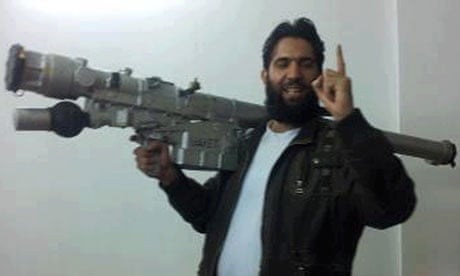
At the New York Times’s At War blog, CJ Chilvers explains why this is important:
Rebel acquisition of any such new-generation missile, be they SA-14s, SA-16s, SA-18s or SA-24s, would be a significant upgrade. Previously, rebels have been seen only with SA-7s, an earlier, much less capable variant in the former Soviet Union’s suite of portable heat-seekers …
If these weapons are turned toward Syrian military aircraft, then supporters of the uprising will have reason to hail them, and Syrian military pilots will have new grounds for worry on their next sorties.
But if these are sold — and weapons of this sort are often said to fetch four- and five-figure dollar sums on black markets — and fired at commercial aircraft, then the consequences and regional security implications of the war in Syria will have become much worse.
This is especially true if the second missile really is an SA-24, one of the world’s most modern heat-seeking missiles and the subject of quite a scare this year in Libya.
He quotes missile proliferation analyst Matt Schroeder of the Federation of American Scientists as saying: “As far as I know, this is the first SA-24 manpads [man-portable air-defence systems] ever photographed outside of state control.”
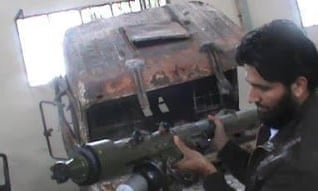
Reuters is now reporting that Turkish fighter jets could be heard near the Syrian border this morning after a Syrian warplane struck Ras al-Ain. Reporters on the Turkish side of the border could not see the jets but heard them approach from Turkish territory, the news agency reports.
Turkey has scrambled jets close to its south-eastern border before in response to Syrian aircraft approaching Turkish airspace.
Turkey's defence minister, Ismet Yilmaz, has said that Turkey will deliver the "necessary response" if Syrian planes or helicopters cross into Turkish airspace.
Ras al-Ain
On Twitter, Zaid Benjamin of Arabic radio station Radio Sawa posts a link to this video, which purports to show warplanes bombing the Syrian town of Ras al-Ain.
The video was posted by the "Ras al-Ain News Network", which has posted a number of videos purporting to show attacks on the town over the last three days.
We are unable to verify these videos.
New Syrian coalition
François Hollande, the French president, has gone further than other world leaders in saying that if/when the new National Coalition of Syrian Revolutionary and Opposition Forces forms a transitional government, France will examine whether to arm the rebels. Paris had previously ruled this out, fearing arms could reach Islamist militants.
Suhair al-Atassi, a vice president of the new coalition, has been speaking to Reuters. She said that once the coalition had proved it represented "revolutionary forces" on the ground, there would be no excuse for western powers not to provide some form of military backing:
The ball now is in the international community's court. There is no more excuse to say we are waiting to see how efficient this new body is. They used to put the opposition to the test. Now we put them to the test.
She blamed western refusal to arm the rebels for the rise of extremism in Syria.
Reuters has a reporter in Ceylanpinar, the Turkish town on the other side of the border from Ras al-Ain.
Their reporter says buildings were rocked in Ceylanpinar when the Syrian jet bombed Ras al-Ain this morning. As Reuters reports, the attack "has brought Syria's civil war back perilously close to Turkish soil, testing a promise by Ankara to defend itself against any spillover of violence from its neighbour."
Yesterday, 90 miles west in the Suruc district of Sanliurfa province, three Turkish border villages were evacuated for "security reasons", a security official told the news agency.
On Monday, Anders Fogh Rasmussen, the secretary general of Nato, said the alliance would defend Turkey if it is attacked.
Ras al-Ain
Reuters has more on the Syrian attack on Ras al-Ain. A witness told the news agency that a Syrian warplane bombed the rebel-held town this morning for a third day, "rocking buildings on the frontier and sending up huge plumes of smoke".
Rebels overran Ras al-Ain last week during an advance into Syria's mixed Arab and Kurdish northeast that has sent thousands of refugees fleeing for safety in Turkey. Syrian jets have been bombing the town since Monday.
As you can see from this map, Ras al-Ain is right on the Turkish border.
This article includes content provided by Google Maps. We ask for your permission before anything is loaded, as they may be using cookies and other technologies. To view this content, click 'Allow and continue'.
Summary
Hello and welcome to today’s Middle East Live. This is Paul Owen covering for Matthew Weaver for the day.
Here is a summary of this morning’s key events so far:
Syria
Hillary Clinton has announced an additional $30m (£18.9m) of humanitarian aid to Syria, bringing the total US aid to the country to $200m. The US secretary of state called the formation of Syria's new opposition coalition, the National Coalition of Syrian Revolutionary and Opposition Forces, an important step that would help Washington better target its help. "As the Syrian opposition takes these steps and demonstrates its effectiveness in advancing the cause of a unified, democratic, pluralistic Syria, we will be prepared to work with them to deliver assistance to the Syrian people,” Clinton said in Australia, after talks with her Australian counterpart and the US defence secretary, Leon Panetta. Clinton said the $30m would help get food to hungry people inside Syria and to refugees who have fled to Turkey, Jordan, Lebanon and Iraq.
France yesterday became the first western country to formally recognise the new opposition coalition as the “sole legitimate representative of the Syrian people”. Six Gulf Arab states also recognised the coalition on Monday. The US, the EU and the Arab League have so far stopped short of giving it formal recognition. William Hague, the British foreign secretary, said the new body had to prove its democratic credentials and show it enjoyed support from all Syrians. A Syrian donors’ conference will be held in London on Friday to discuss stepping up non-lethal aid to the new group, which is headed by Moaz al-Khatib.
Reuters is reporting that a Syrian warplane has bombed the rebel-held town of Ras al-Ain on the Turkish border for a third day.
Jordan
Violent protests broke out across Jordan last night after the government announced an increase in fuel prices, inciting anger directed at the king after months of mounting tension in the kingdom.
Iraq
Iraqi insurgents unleashed a new wave of bombings across the country this morning, targeting security forces and civilians, killing 12 people and wounding dozens more.
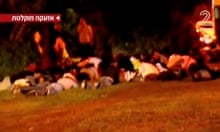
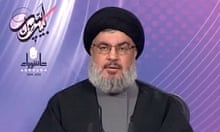

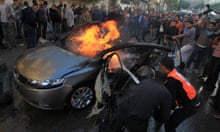
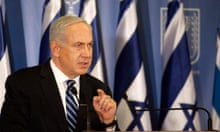
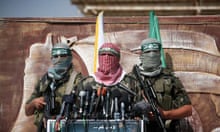
Comments (…)
Sign in or create your Guardian account to join the discussion